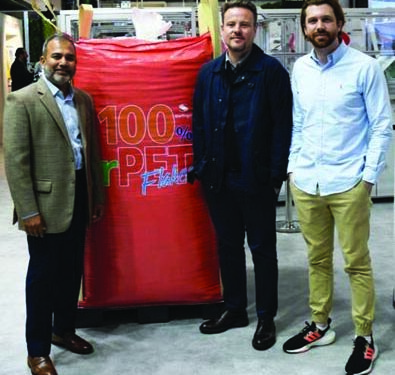NE BUSINESS BUREAU
AHMEDABAD, NOV 8
Aiming to fulfill the Atmanirbharbharat, the city-based Umasree Texplast entered into a joint venture with the Brazil based Packem to make FIBC/Jumbo Bags from PET/PCR with an investment of $15 million (appx. 120 crores) for a new plant in Gujarat to support circular economy.
The plant to be commissioned near Ahmedabad to produce 100% sustainable FIBC (Flexible Intermediate Bulk Container)/Jumbo Bags made of PET/PCR (rPET).
- Umasree Texplast has entered into a Joint Venture with Brazil based Packem to make FIBC/Jumbo Bags from PET/PCR with an investment of $15 million (appx. 120 crores) for a new plant in Gujarat to support circular economy and Make in India.
Umasree holds a 49% equity in Packem Umasree Pvt. Ltd., the JV, and Packem, which recently became the first Brazilian company to produce 100% sustainable FIBC/Jumbo Bags made of PET/PCR (rPET), will hold 51%. Packem Umasree will be the first company in India to start producing FIBC/ Jumbo Bags made from 100% rPET/ PCR (Recycled PET) with the concept of Bottle to Bag.
“We chose to form the joint venture with Packem because it is a young and energetic company with a vision for the future. India is a strategic location to serve the global market and we have been operating in this market since 2005. We have launched a 100% recycled and recyclable product and we felt Packem is a perfect fit with our philosophy of sustainability,” said Umasree’s CEO, Punit Gopalka.
The new production unit to come near Ahmedabad which will produce 100 % sustainable FIBC / Jumbo Bags is expected to create about 700 jobs. The plant will help India become self-reliant as well as emerge as a hub for exports of the bags.
“This new facility in Asia will take Packem to global markets that are already served today by Umasree, in PP bags, especially the USA, Canada and Europe. We have been Umasree’s business partners for over 10 years, and it was this relationship of trust that enabled the Joint Venture to further strengthening this partnership,” said Eduardo Santos Neto, CEO of Packem.
The global FIBC market is led by five countries India, China, Vietnam, Turkey, and Mexico. In 2021, these countries exported 250 million units, with India accounting for 50% of that volume. At least two per cent of the global FIBC / Jumbo Bag market will be able to immediately replace the polypropylene product with recycled PET/PCR bags and this replacement will increase over the years.
“Our rPET big bag will bring great environmental and social benefits to India, in addition to direct jobs. It is estimated that every metric tonne of recycled plastic will create three local jobs for the collection and recycling industry. In addition, our project will create local demand for post-consumer PET bottles, with a positive impact on oceans, rivers and the environment in general,” pointed out Marcos Spitzner Filho, CFO of Packem.
The rPET/PCR to FIBC/Jumbo bags is the greatest innovation of recent years in the segment of packaging for agriculture and will help in developing a circular economy. The first 100% bag-to-bag projects in the world will see big bags used in the field processed and recycled to be made into big bags again. The company will reuse 100% of the rPET FIBC / Jumbo Bags and help reduce virgin plastic from agribusiness and industry.
The special technology for the production of high-performance fabrics from recycled rPET/PCR is exclusive to the Austrian Company Starlinger, the world leader in the production of machines for raffia plastic packaging and recycling equipment for plastics.
The JV was assisted by MNSS Advisors, as the financial, legal and tax advisor to Umasree, and by law firm Trilegal, which handled Packem’s matters.












